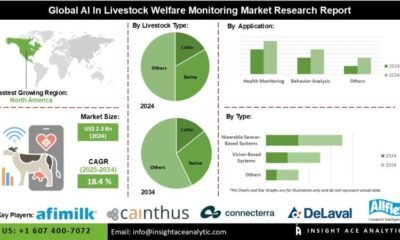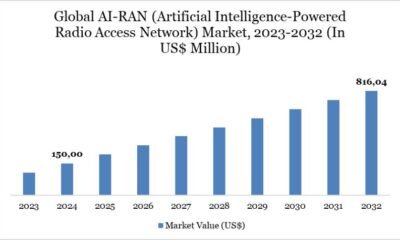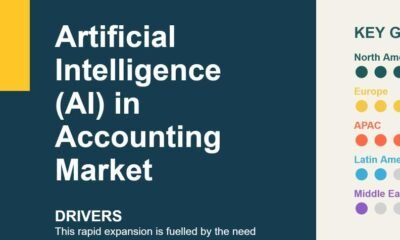There’s a concept in technology called Amara’s Law, named after the Futurist Roy Amara. The law basically states that humans tend to overestimate the effect of a technology in the short run and underestimate its effect in the long run.
I think there might be an exception to this rule, at least from today’s starting point.
Artificial intelligence (AI). In my view, I think people are wildly underestimating its impact in the short as well as the long term.
I’ll start with some background. AI, at its most basic, is about creating computer systems that can replicate human intelligence a…
AI Insights
Artificial Intelligence in Healthcare Market to Reach USD

Mordor Intelligence has published a new report on the Artificial Intelligence in Healthcare Market offering a comprehensive analysis of trends, growth drivers, and future projections.
Introduction
According to a 2025 report on AI in healthcare market by Mordor Intelligence, the market is estimated at USD 39.92 billion in 2025 and is projected to reach USD 196.91 billion by 2030, growing at a CAGR of 37.60 percent during the forecast period.
The artificial intelligence in the healthcare market [https://www.mordorintelligence.com/industry-reports/artificial-intelligence-in-healthcare-market?utm_source=abnewswire] is witnessing rapid growth as hospitals, pharmaceutical companies, and healthcare providers increasingly adopt AI tools to improve patient care and operational efficiency. AI is used for a range of applications including diagnostics, imaging analysis, drug discovery, virtual assistants, and patient management.
Key Market Trends
AI in Diagnostics and Imaging
AI tools are widely used to analyze medical images such as X-rays, MRIs, and CT scans. Hospitals and diagnostic centers are adopting AI-powered imaging solutions to detect diseases like cancer, neurological conditions, and cardiovascular diseases with higher accuracy and speed. This reduces diagnostic errors and supports clinicians in providing timely treatment.
Use of AI in Drug Discovery and Development
Pharmaceutical companies are leveraging AI platforms to identify new drug candidates, analyze molecular structures, and predict drug responses. AI is helping reduce the time and cost involved in drug development by accelerating research, screening compounds efficiently, and supporting clinical trial processes.
Growth of Virtual Health Assistants and Chatbots
AI-based virtual assistants are being used in hospitals and clinics for appointment scheduling, medication reminders, answering patient queries, and post-discharge follow-ups. This trend is helping healthcare providers reduce administrative workloads and improve patient engagement and satisfaction.
Application of AI in Personalized Medicine
AI enables analysis of patient-specific data including genetic information, medical history, and lifestyle factors to recommend tailored treatment plans. This is supporting the growth of personalized medicine, especially in oncology, where targeted therapies are crucial for effective treatment outcomes.
Adoption of AI for Administrative Workflow Automation
Hospitals and healthcare providers are using AI to automate administrative tasks such as billing, claim processing, and patient data management. This trend is helping reduce operational costs, minimize errors in records, and improve workflow efficiency across departments.
Market Segmentation
By Technology
Machine Learning, Deep Learning, NLP, Computer Vision, Generative AI/Foundation Models, Reinforcement Learning, Others
These technologies form the backbone of AI healthcare tools. Machine learning and deep learning power predictive analytics and image interpretation, while NLP supports automated documentation and clinical decision support. Emerging technologies like generative AI and foundation models which are expanding at roughly 48% CAGR represent the fastest-growing tech area.
By Application
Robotassisted Surgery, Virtual Assistants, Precision & Personalized Medicine, Remote patient Monitoring, Fraud Detection, Others
AI is applied across care delivery and support systems. It’s used in robotic surgery, intelligent scheduling assistants, and automated billing workflows. Diagnostic imaging remains a dominant use case, with AI helping analyze scans and track disease progression. AI also supports clinical trials with data management, and aids in fraud detection and cybersecurity in patient records
By Offering
Hardware, Software, Services
Offerings in AI healthcare span physical devices, digital tools, and consultancy/support services. Software, which includes AI platforms and specialized applications, holds a significant market share given hospitals’ reliance on digital diagnostics, workflow optimization, and predictive analytics.
By End User
Hospitals & Healthcare Providers, Patients, Pharmaceutical & Biotechnology Companies, Healthcare Payers, Others
This segmentation captures the diverse customer base for AI solutions. Hospitals and providers make up the bulk of users for diagnostic or workflow tools. Patients benefit indirectly via virtual health apps or monitoring. Pharma and biotech firms use AI for drug discovery and trial enhancement. Payers leverage AI in claims processing, fraud detection, and cost management.
By Geography
North America, Europe, AsiaPacific, Middle East & Africa, South America
Geographic segmentation highlights regional differences: North America leads due to its healthcare infrastructure and investment capacity, while AsiaPacific is identified as the fastest-growing due to rising digital adoption and government-backed health tech initiatives
Key Players
*
IBM Corporation A leading AI healthcare provider, IBM offers robust diagnostic and analytics solutions such as the Watson Health platform that assist hospitals and clinics in decision support, oncology, and imaging workflows.
*
Google LLC (Alphabet) Through its Google Health and DeepMind divisions, Google is developing AI-enabled medical imaging tools and predictive health models. Its efforts include diabetic retinopathy detection and cardiology risk prediction, leveraging advanced AI algorithms.
*
NVIDIA Corporation NVIDIA delivers critical AI infrastructure including GPUs and deeplearning frameworks that support healthcare AI applications in diagnostics and image processing. Healthcare institutions rely on hardware acceleration for largescale AI deployment.
*
Microsoft Corporation Microsoft provides AI services integrated into Azure and its healthcare cloud, supporting predictive insights, imaging analysis, and seamless EHR integration for clinician support
Conclusion
The AI in the healthcare market is experiencing strong growth, supported by the increasing demand for diagnostic accuracy, efficient hospital workflows, and personalized care solutions. The use of AI in diagnostics, imaging, drug discovery, and patient management is expected to rise further as hospitals and pharmaceutical companies seek cost-effective, data-driven decision-making tools.
North America will continue to lead in terms of market share, while Asia-Pacific will emerge as a key growth region due to its expanding healthcare infrastructure and government initiatives in digital health. Key players are focusing on enhancing their AI capabilities through continuous investment in research, partnerships with healthcare providers, and expanding AI applications in various medical fields.
Get more insights: https://www.mordorintelligence.com/industry-reports/artificial-intelligence-in-healthcare-market?utm_source=abnewswire
Industry Related Reports
Artificial Intelligence in Medicine Market: [https://www.mordorintelligence.com/industry-reports/artificial-intelligence-in-medicine-market?utm_source=abnewswire] The Artificial Intelligence (AI) in Healthcare Market report is segmented by Application Type (Medical Administration and Support, Patient Management, Research and Development, Other Applications), by Type (Hardware, Software, Services), and by Geography (North America, Europe, Asia-Pacific, Latin America, Middle East and Africa). The report offers market forecasts and size in value (USD) for all the above segments.
North America Artificial Intelligence in Healthcare Market: The Artificial Intelligence in Healthcare Market North America report segments the industry into by Technology (Natural Language Processing (NLP), and more), by Application (Robot-assisted Surgery, and more), by Offering (Hardware, Software, Services), by End User (Healthcare Payers, and more), and by Geography (United States, and more).
For More information: https://www.mordorintelligence.com/industry-reports/north-america-artificial-intelligence-in-healthcare-market?utm_source=abnewswire
AI In Medical Billing Market: [https://www.mordorintelligence.com/industry-reports/ai-in-medical-billing-market?utm_source=abnewswire] The AI in Medical Billing Market report segments the industry into by Deployment (Cloud, On-Premises), by Applications (Automated Billing and Documentation, Claims Processing, Fraud Detection, Other Applications), by End Users (Hospitals and Clinics, Healthcare Payers, Ambulatory Surgical Centers, Other End Users), and by Geography (North America, Europe, Asia, Australia and New Zealand, Latin America, Middle East and Africa).
About Mordor Intelligence: Mordor Intelligence is a trusted partner for businesses seeking comprehensive and actionable market intelligence. Our global reach, expert team, and tailored solutions empower organizations and individuals to make informed decisions, navigate complex markets, and achieve their strategic goals. With a team of over 550 domain experts and on-ground specialists spanning 150+ countries, Mordor Intelligence possesses a unique understanding of the global business landscape. This expertise translates into comprehensive syndicated and custom research reports covering a wide spectrum of industries, including aerospace & defense, agriculture, animal nutrition and wellness, automation, automotive, chemicals & materials, consumer goods & services, electronics, energy & power, financial services, food & beverages, healthcare, hospitality & tourism, information & communications technology, investment opportunities, and logistics.
For any inquiries or to access the full report, please contact:media@mordorintelligence.com https://www.mordorintelligence.com/
Media Contact
Company Name: Mordor Intelligence Private Limited
Contact Person: Jignesh Thakkar
Email:Send Email [https://www.abnewswire.com/email_contact_us.php?pr=artificial-intelligence-in-healthcare-market-to-reach-usd-19691-billion-by-2030-driven-by-diagnostics-and-imaging-applications]
Phone: +1 617-765-2493
Address:5th Floor, Rajapushpa Summit, Nanakramguda Rd, Financial District, Gachibowli
City: Hyderabad
State: Telangana 500008
Country: India
Website: https://www.mordorintelligence.com/
Legal Disclaimer: Information contained on this page is provided by an independent third-party content provider. ABNewswire makes no warranties or responsibility or liability for the accuracy, content, images, videos, licenses, completeness, legality, or reliability of the information contained in this article. If you are affiliated with this article or have any complaints or copyright issues related to this article and would like it to be removed, please contact retract@swscontact.com
This release was published on openPR.
AI Insights
A perspective on Artificial Intelligence and digital rights

ARTIFICIAL INTELLIGENCE NOW permeates daily life From the smartphone assistants many of us carry to credit scoring, healthcare imaging, and government services, technological high-end systems (pro-AI-driven) are becoming progressively foundational, invisible, and everywhere in our institutions and economy.
AI is set to be deployed not just in consumer chatbots but in serious public services, such as predictive crop insurance models for farmers, citywide surveillance networks, service-enabled welfare delivery, and voice-based legal assistance in local languages. This technological ubiquity tends to inspire both wonder and anxiety. Yet many users and policymakers instinctively frame AI as a tool or assistant – a way to augment human capabilities – rather than as a competitor or replacement.
We seek the benefit of AI’s speed or pattern-recognition while expecting humans to remain in the loop. This view – that AI should help us rather than supplant us – is a useful starting point when thinking about its impact. It suggests that as we build laws and policies, we treat AI as an enabler of human goals, not a separate “being” with rights.
Even so, we must confront a knotty question: what are “digital rights” in an age of AI? The term appears increasingly in policy debates, but its definition is not self-evident. At a minimum, it implies that citizens retain rights and protections in the digital realm – over their data, their devices, their online speech, and access. AI governance sits atop a vast array of “digital” issues: not just data privacy and security, but digital property, service rights, contract rights, infrastructure access, and more. In practice, “digital rights” often parallel our traditional civil liberties (privacy, expression, equality, etc.) but take on a new shape when technology is involved.
India’s Supreme Court, for instance, has treated privacy as a fundamental right under Article 21 of the Indian Constitution, and that has become the constitutional grounding for digital protections in privacy cases. We may even codify rights like data protection or internet access into constitutions for permanence. But, before debating AI ethics or rulemaking, we shall clarify what rights we mean. Should a “right to algorithmic fairness” be elevated to the same level as speech or equality? Do we expect new rights beyond the existing roster of liberties, or are our current rights simply being translated into code?
AI Insights
Is artificial intelligence coming for you?

AI Insights
First lady Melania Trump hosts Task Force on Artificial Intelligence Education meeting

WASHINGTON (TNND) — First Lady Melania Trump will join members of the White House Task Force on Artificial Intelligence Education and private sector leaders for a meeting Thursday.
This is the second meeting of the task force, where the first lady, task force members, and others will speak about the over 135 pledges made to support AI education across the country.
“I predict AI will represent the single largest growth category in our nation during the Trump Administration—and I won’t be surprised if AI becomes known as the greatest engine of progress in the history of the United States of America. But, as leaders and parents we must manage AI’s growth responsibly. During this primitive stage, it is our duty to treat AI as we would our own children—empowering, but with watchful guidance. We are living in a moment of wonder, and it is our responsibility to prepare America’s children,” said the first lady.
In August, the first lady launched a nationwide Presidential Artificial Intelligence Challenge, which invites students and educators to”unleash their imagination and showcase the spirit of American innovation.”Students can sign up by visiting AI.Gov.
The actions follow an executive order signed by President Donald Trump in April on “Advancing Artificial Intelligence Education for American Youth.”
Melania Trump has long worked to protect children online through her BE BEST initiative and the passage of the TAKE IT DOWN Act, which received bipartisan support and was signed into law by the president in May.
The TAKE IT DOWN Act aims to combat the proliferation of artificial intelligence-generated explicit imagery, a growing concern in the digital age. The bill also seeks to protect children from deep fake exploitation.
“As first lady, my commitment to the Be Best initiative underscores the need for online safety,” the first lady said. “Ensuring their protection is not just a responsibility but a vital step in nurturing future leaders,” the first lady said in March.
On Thursday evening, President Trump will host major tech CEOs for a dinner at the White House.
The guest list includes Microsoft cofounder Bill Gates, Apple CEO Tim Cook, Meta CEO Mark Zuckerberg and a dozen other executives from the biggest artificial intelligence and tech firms, the White House says.
Some of the attendees at Trump’s dinner are expected to participate in the first lady’s task force meeting.
-

 Business6 days ago
Business6 days agoThe Guardian view on Trump and the Fed: independence is no substitute for accountability | Editorial
-
Tools & Platforms3 weeks ago
Building Trust in Military AI Starts with Opening the Black Box – War on the Rocks
-

 Ethics & Policy1 month ago
Ethics & Policy1 month agoSDAIA Supports Saudi Arabia’s Leadership in Shaping Global AI Ethics, Policy, and Research – وكالة الأنباء السعودية
-

 Events & Conferences4 months ago
Events & Conferences4 months agoJourney to 1000 models: Scaling Instagram’s recommendation system
-

 Jobs & Careers2 months ago
Jobs & Careers2 months agoMumbai-based Perplexity Alternative Has 60k+ Users Without Funding
-

 Education2 months ago
Education2 months agoVEX Robotics launches AI-powered classroom robotics system
-

 Funding & Business2 months ago
Funding & Business2 months agoKayak and Expedia race to build AI travel agents that turn social posts into itineraries
-

 Podcasts & Talks2 months ago
Podcasts & Talks2 months agoHappy 4th of July! 🎆 Made with Veo 3 in Gemini
-

 Podcasts & Talks2 months ago
Podcasts & Talks2 months agoOpenAI 🤝 @teamganassi
-

 Education2 months ago
Education2 months agoMacron says UK and France have duty to tackle illegal migration ‘with humanity, solidarity and firmness’ – UK politics live | Politics





















